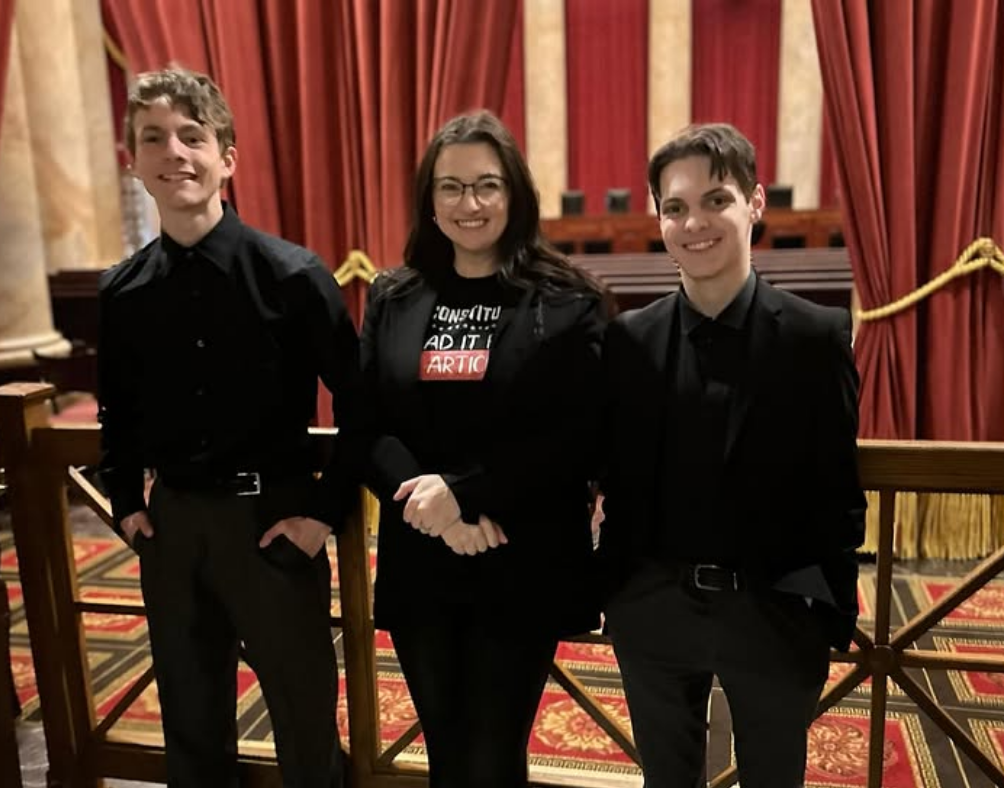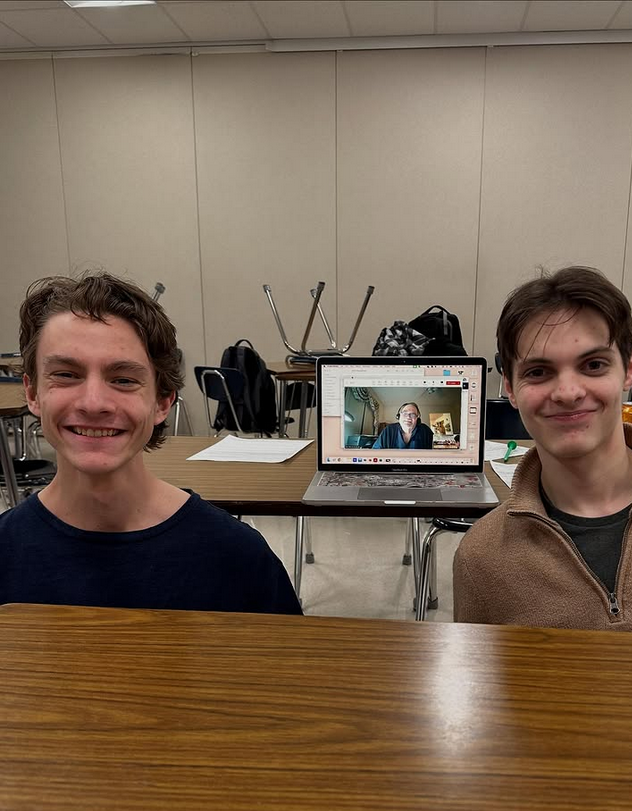
Against Impossible Odds: An Unforgettable Constitutional Competition
When budget cuts eliminated her Constitutional Law class, teacher Jacki Pope Brothers thought her students’ competitive dreams were over. Instead, what followed became an inspiration that captured national attention and redefined what’s possible in education.
Jacki Pope Brothers wasn’t an overachiever in her social studies classes—decent grades, but nothing special. Then she met her civics teacher, Mr. Gerrit Koepping, and everything changed. His class and a program called We the People inspired her to become a social studies teacher.
We the People, sponsored by the Center for Civic Education, helps students learn more deeply about the Constitution. Each year they research constitutional issues and compete in a simulated congressional hearing for a panel of adult judges.
For Jacki, the program left a profound impression. “It was so empowering. It really did show me the importance of being a citizen, being engaged, and understanding our government.”
When she became a teacher at Sprague High School in Oregon, she made it her mission to start a We the People team there. After seven years of lobbying, that dream became a reality.
A Rocky Start to We the People
From their first competition in 2018, it was a hit with her students. But in spite of their enthusiasm and successes at the regional competition, outside problems plagued the program. The pandemic shut it down for a time, but the biggest blow came in 2024 when Jacki learned that budget cuts meant Sprague would no longer offer the Constitutional Law class in which she coached We the People.
When she broke the news to her students, two of them refused to accept it without a fight.
Matthew Meyers and Colin Williams were determined to find a way to compete in We the People in their senior year. Inspired by their eagerness, Jacki was able to get her administration to offer Con Law as an independent study held concurrently with her Government class.
Jacki shared the news with the boys with a word of caution that they’d need to be self-motivated. She’d be teaching 36 other students in the classroom. “I was also very pregnant,” Jacki says, “and planned on taking maternity leave during competition season.” The enthusiasm of Matthew and Colin led her to agree to postpone her leave until after We the People was over. The season lasted longer than she expected.

Getting Ready to Compete
The workload for We the People is daunting. There are six units in the curriculum, and each unit includes three constitutional questions. Typically, three to six students focus on a single unit, which means most teams have over 20 students.
At the competition, students first offer prepared testimony and are scored based on their understanding and application of constitutional principles, their reasoning and use of evidence, and how well they split their answers among them. If one student dominates the discussion, the team loses points.
Students then put their notes away while judges ask follow-up questions. Students are expected to coherently answer with constitutional examples, Supreme Court cases, historical events, and a firm grasp on foundational principles—while still splitting the time among them. Only having two students meant that both Matthew and Colin would need to prepare for all questions across all six units.
Two students. Six units. Eighteen constitutional questions. Against teams with over 20 students. How could they stand a chance?
TAH Provides Community and Support
Jacki had to find a way. During her years as the We the People coach, she had been improving her own understanding of the Constitution. After winning the prestigious James Madison Fellowship, she learned about Teaching American History’s MA in American History & Government (MAHG).
“I was actually looking for a master’s in Legal Studies because all I really wanted to focus on was the Constitution. I kept hearing, ‘Look, there’s this program. It’s amazing. You can choose your classes based on what you want to tailor it to.’ And so, once I started comparing different programs, I just really liked this one.”
Jacki’s MAHG classes provided her with a deep knowledge base to share with Colin and Matthew. “What I found this time was that I had so many more resources to direct them towards. I could tell them which Federalist Paper they should read or who had a great speech about that topic.”
These resources made it possible to keep Matthew and Colin engaged while she taught the other 36 students in the room, but it was the community she found in MAHG that made it possible for them to excel.
“What I found most helpful about the MAHG program was actually the connections that I made—connections with other teachers and with my professors.” These connections proved invaluable as they prepared for the competition.
A fellow teacher Jacki met through MAHG was Sam Ulmschneider, whose We the People teams have won the National competition three times. Their teams met on Zoom to quiz each other and sharpen their answers. Jacki credits this kind of collaboration as essential in the success of her team.
It certainly paid off come January. In a shocking performance, her team of two won at Regionals and advanced to the State competition. This meant Jacki’s maternity leave would be postponed a couple more weeks as they prepared for the new challenge.
At State, Matthew and Colin again stunned the competition, took second place, and earned an invitation to Nationals.
“My maternity leave doubled as a sort of Help-Us-Get-To-Nationals Leave,” Jacki jokes. As she spent time with her daughter during her leave, she raised funds for the trip and continued working with Matthew and Colin. She also tapped into her MAHG network to prepare for the next level.

MAHG professor Dan Monroe agreed to meet with her students on Zoom.
“I really wanted hard questions to stump them on various topics,” she says. It worked. “Professor Monroe spent time with them, getting into the weeds of how things like the Connecticut Compromise affected the political power of the South for years to come.”
Another MAHG professor, Eric Sands, also met with her students. “It was really fun to watch these educators who inspired me in my graduate classes work with my own students.”
Jacki acknowledges that a community like this is unique. “It had such a huge impact.”
The National We the People Experience
With their preparation complete, the newcomers joined 47 of the nation’s best teams in Washington, D.C. for Nationals. Jacki tried to encourage them to relax and enjoy the experience: “Whatever happens now doesn’t matter. You’ve worked so hard and you’ve already done the impossible.”
But Matthew and Colin didn’t heed that advice. They decided their goal was to make it into the top ten.
What happened over those next three days was legendary.
On the first day, it was hard to avoid feeling like fish out of water. Jacki noticed that the competition rooms were set up to accommodate much larger teams with accompanying spectators. With the average team size being 21 students, Matthew and Colin’s sessions had a lot of empty chairs. However, their strong grasp of the Constitution wowed the judges. People took notice.
“By day two, word was spreading through the grapevine about this team of two. People we didn’t know started to trickle in to our sessions and the empty chairs filled up with visitors.” As the excitement grew around them, Jacki felt like Matthew and Colin were hitting their stride. “Even some of the other judges who weren’t going to be on our panels sat in to watch.”
Day two ended with the announcement of the top ten teams that would advance to the last day of the competition. Against all odds, Sprague was one of them. Jacki’s students—along with the new fans who started rooting for the underdogs—were ecstatic.
They achieved their goal and made it to day three. They finally let themselves relax and try to enjoy the experience. And throughout the final round, their audiences continued to grow.
After another impressive day, the only thing left was the award ceremony. They announced the results, starting with the tenth-place finisher. “When the first couple of teams were called, we figured eighth place would be a great finish. And then they called someone else. So we joked that seven is a lucky number, it’s great to get seventh.”
Soon Jacki started to wonder if there had been a mistake. “Did they forget about us?”
After the third place was called, they noticed that there were more than two silver medals waiting for second place. They realized what was happening. “We were just in shock and everyone around us started going crazy.”
The team of two did the impossible. They won the whole thing.
“We were there for over an hour because there was a line of students waiting to get selfies and exchange Instagram information. I mean, it’s not often that you’re appreciated for your brain, right? It was fun to be surrounded by a community that understood how much work that really was and how amazing this success was. It was magical.
The Aftermath of a National Championship
We spoke with Jacki at the end of the school year to find out what’s next.
“Matthew was going to go into medicine, but now he’s planning to study law and ethics. Colin was going to major in computer science, but he’s now adding a double major so he can also study political science.”
Of course, Jacki can relate, having traced the genesis of her own career back to Mr. Koepping, her We the People coach. “I want this to be a legacy for our school. I want our students to have something they can be a part of that is bigger than just them.”
It takes an exceptional teacher to guide students to this level of success, but Jacki doesn’t feel comfortable taking too much credit. “It was truly a community of those who believe in the importance of legal education.” It was because she shared in this belief that she enrolled in MAHG. In doing so, she expected simply to build her own understanding of the Constitution. “But I didn’t know I would also be building relationships and making connections that truly made the difference in my students, elevating their understanding of these difficult topics.”
As for the future of We the People at Sprague High School, Jacki is optimistic. A year previously, Jacki and her students devised a creative way to save her Con Law class from budget cuts. After winning Nationals, the administration agreed to continue offering the class if students register for it.
By the end of the school year, 32 students were on her roster.



